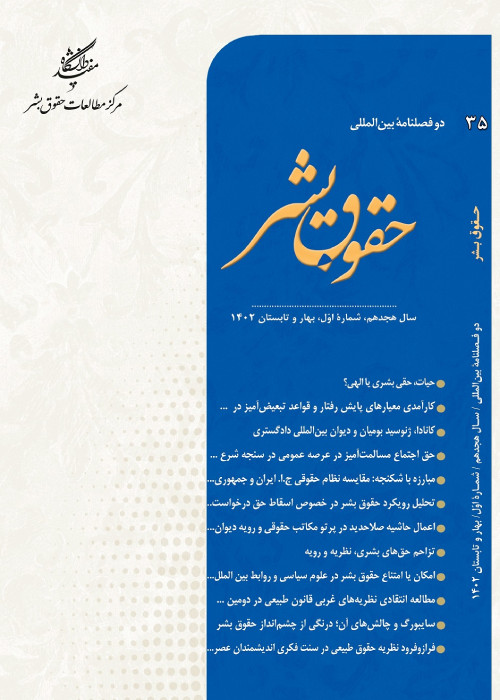The Boundaries of Religious Persecution: Refugee Law and the Limits of Permissible Restrictions on Religion
Author(s):
Article Type:
Research/Original Article (بدون رتبه معتبر)
Abstract:
The right to freedom of religion or belief has been well-established in human rights instruments since the inception of the modern era of international law. However, while inner freedom of belief has been uncontested, the ability to manifest those beliefs publicly has been made subject to limitations for certain purposes which include public safety and order, health, morality and the fundamental rights and freedoms of others. The degree to which such restrictions on religious practice may be permissible under the rubric of international human rights law has been and continues to be under debate. International refugee law has played an important role in safeguarding religious freedom, as persecution for reasons of religion is one of the five grounds enumerated in the 1951 Convention relating to the Status of Refugees. To what degree are restrictions on religious practice permissible and at what point do such restrictions rise to the level of persecution meriting international protection? An examination of the refugee jurisprudence of States adjudicating religion-based claims will help illustrate the nebulous boundaries of the definition of persecution in the context of religious practice and identify some of the factors and trends which influence refugee decision-making.
Part I will provide an overview of international refugee law as it relates to religion and describe the Westphalian context under which it was constructed. The modern era of international law was strongly influenced by wars of religion and the principle of cuius regio, eius religio – whose the rule, his the religion – which emphasized respect for national sovereignty and non-interference in religious affairs of the state as essential to international stability. International refugee law, developed largely in response to World War II and the Holocaust, attempts to balance respect for national sovereignty with humanitarian protection concerns by only applying to persons outside their country of origin. Part II will discuss refugee jurisprudence interpreting the point at which religious restrictions constitute a well-founded fear of persecution and highlight issues which form the boundaries of persecution. How does refugee law distinguish discrimination, which does not merit international protection, from persecution? Should refugees be able to avoid the prisoners’ dilemma of either renouncing their identity or beliefs or face persecution and should the imposition of a moral view constitute serious or grave harm? What deference should be given to religious States who advocate a certain religion as an affair of the State, whether through Shari’a or other religious laws? Can persecution be caused by non-State actors or religious extremists and is non-State sectarian violence a matter for refugee law? Part III will reflect on the inextricable links between religion and politics, economics and culture in light of the fact that religion demands practice by adherents and dictates standards of social conduct. It will discuss the relationship between States and religion and consider whether and how international refugee law promotes religious toleration and pluralism.
Part I will provide an overview of international refugee law as it relates to religion and describe the Westphalian context under which it was constructed. The modern era of international law was strongly influenced by wars of religion and the principle of cuius regio, eius religio – whose the rule, his the religion – which emphasized respect for national sovereignty and non-interference in religious affairs of the state as essential to international stability. International refugee law, developed largely in response to World War II and the Holocaust, attempts to balance respect for national sovereignty with humanitarian protection concerns by only applying to persons outside their country of origin. Part II will discuss refugee jurisprudence interpreting the point at which religious restrictions constitute a well-founded fear of persecution and highlight issues which form the boundaries of persecution. How does refugee law distinguish discrimination, which does not merit international protection, from persecution? Should refugees be able to avoid the prisoners’ dilemma of either renouncing their identity or beliefs or face persecution and should the imposition of a moral view constitute serious or grave harm? What deference should be given to religious States who advocate a certain religion as an affair of the State, whether through Shari’a or other religious laws? Can persecution be caused by non-State actors or religious extremists and is non-State sectarian violence a matter for refugee law? Part III will reflect on the inextricable links between religion and politics, economics and culture in light of the fact that religion demands practice by adherents and dictates standards of social conduct. It will discuss the relationship between States and religion and consider whether and how international refugee law promotes religious toleration and pluralism.
Keywords:
Language:
English
Published:
Journal of Human Rights, Volume:13 Issue: 26, 2019
Pages:
141 to 174
magiran.com/p1953411
دانلود و مطالعه متن این مقاله با یکی از روشهای زیر امکان پذیر است:
اشتراک شخصی
با عضویت و پرداخت آنلاین حق اشتراک یکساله به مبلغ 1,390,000ريال میتوانید 70 عنوان مطلب دانلود کنید!
اشتراک سازمانی
به کتابخانه دانشگاه یا محل کار خود پیشنهاد کنید تا اشتراک سازمانی این پایگاه را برای دسترسی نامحدود همه کاربران به متن مطالب تهیه نمایند!
توجه!
- حق عضویت دریافتی صرف حمایت از نشریات عضو و نگهداری، تکمیل و توسعه مگیران میشود.
- پرداخت حق اشتراک و دانلود مقالات اجازه بازنشر آن در سایر رسانههای چاپی و دیجیتال را به کاربر نمیدهد.
دسترسی سراسری کاربران دانشگاه پیام نور!
اعضای هیئت علمی و دانشجویان دانشگاه پیام نور در سراسر کشور، در صورت ثبت نام با ایمیل دانشگاهی، تا پایان فروردین ماه 1403 به مقالات سایت دسترسی خواهند داشت!
In order to view content subscription is required
Personal subscription
Subscribe magiran.com for 70 € euros via PayPal and download 70 articles during a year.
Organization subscription
Please contact us to subscribe your university or library for unlimited access!


